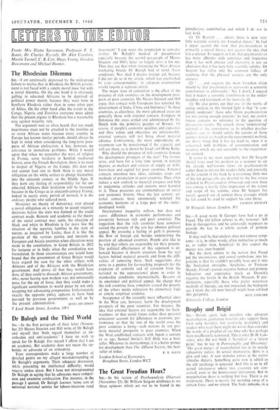Dr Balogh and the Third World
Stu,—In the first paragraph of their letter (Novem- ber 25) Messrs Streeten and Hill write of Dr Balogh and myself that 'both regard themselves as un- orthodox and anti-academic.' I have no wish to speak for Dr Balogh. For myself I affirm that I am an academic. But academic does not mean the up- holder or advocate of an orthodoxy.
Your correspondents make a large number of detailed points on my alleged misunderstanding of Dr Balogh's arguments. Their adequate discussion, while presenting no intellectual difficulty, would require undue space. But I have not misrepresented Dr Balogh in saying that he advocates mass compul- sion and extensive confiscation. For instance, in the Passage I quoted, Dr Balogh favours 'some sort of universal national service for labour-intensive rural investment.' I can resist the temptation to consider further Dr Balogh's method of presentation especially because the second paragraph of Messrs Streeten and Hill's letter so largely does it for me. Thus they say that when instancing the West African marketing boards Dr Balogh had in mind Asian conditions. Nor shall 1 discuss foreign aid, because I did not do so in my article, which was overlooked by your correspondents: its adequate examination would require a separate article.
The major issue of contention is the effect of the presence of rich countries on the development pros- pects of poor countries. Do Messrs Streeten and Hill argue that contact with Europeans has retarded the development of India, China and Indonesia? In these countries, as elsewhere, the most advanced areas arc generally those with external contacts. Compare in Indonesia the areas settled and administered by the Dutch with the primitive peoples of Borneo. Of course, if people's economic qualities and capacities and their values and objectives are unfavourable. external contacts will not bring about material advance. Contrariwise, the most unpromising en- vironment can be transformed if the capacity and will are there, as is shown by Israel and Hong Kong.
Why should the presence of rich countries damage the development prospects of the rest? The former serve, and have for a long time served, in varying degrees, as markets and sources of supply of skills. know-how and capital for poor countries. External contacts introduce new ideas, attitudes, crops and methods of production in poor countries. They often induce a new outlook to material progress and help to undermine attitudes and customs most harmful to it. These processes are commonplaces of social and economic history. Over the last century, ex- ternal contacts have enormously widened the economic horizons of a large part of the under- developed world.
International inequality reflects, but does not cause, differences in economic performance and prosperity between rich and poor countries. The suggestion that the rich countries have somehow caused the poverty of the rest has obvious political appeal. By arousing a feeling of guilt it promotes the flow of foreign aid, besides undermining the position of advanced countries. People also like to be told that others are responsible for their poverty. The political effectiveness of this argument is en- hanced because it diverts attention from the real factors behind material poverty and from the diffi- culties of removing these. Such suggestions also serve as a pretext for far-reaching proposals for the extension of controls and of coercion from the national to the supranational plane in order to standardise conditions internationally. Because of its emotional and political appeal, the charge that the rich countries have somehow caused the poverty of the others resists refutation by elementary logic or simple empirical evidence.
Acceptance of the currently most influential ideas in the West can, however, harm the development prospects of the poor countries. For instance, the idea that external factors are responsible for back- wardness, or that social forces rather than personal endeavour account for differences in economic per- formance, or that the rest of the world owes the poor countries a living—such notions do not pro- mote material prosperity in poor countries. When the West established contacts with Japan a century or so ago, Samuel Smiles's Self Help was a best- seller. Whatever its shortcomings, it is a better primer for development than The Affluent Society, the best-


































 Previous page
Previous page